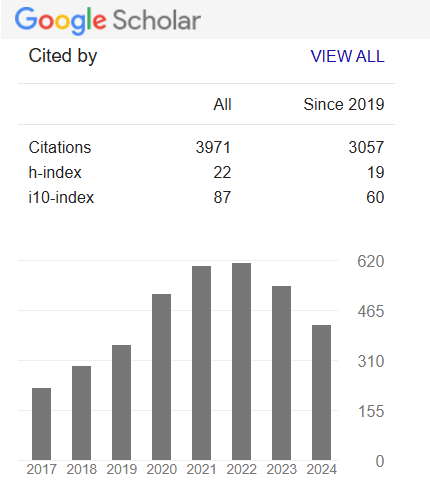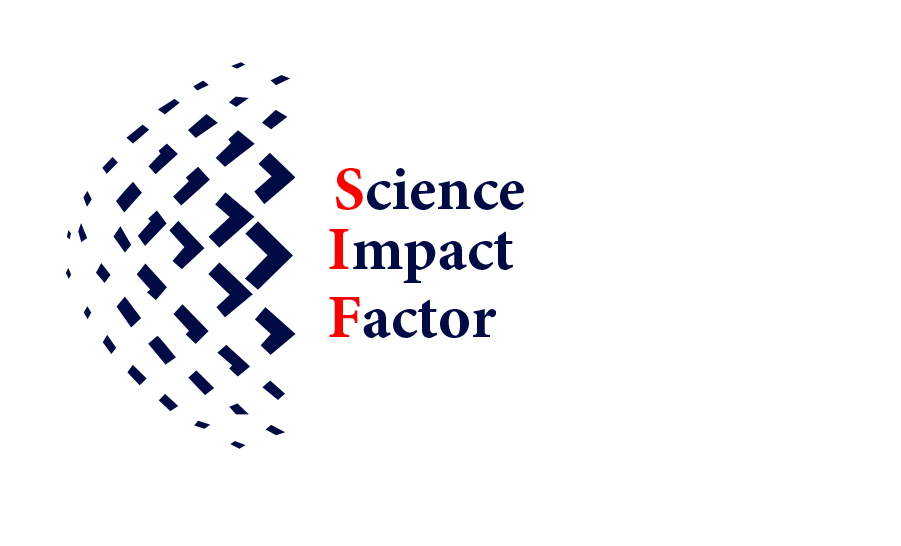Screening and detection of Proteinicious Protease Inhibitor from Some Plants from MTR, Maharashtra, India
Keywords:
Protease Inhibitor, X-ray Film, Trypsin, Pepsin, PapainAbstract
Plant protease inhibitors are widely distributed in various plants and majorly reported in seeds. Melghat Tiger Reserved (MTR), Maharashtra region is rich in plant diversity, 714 plant species are reported from the region. The plants used in this study are reported for variety of pharmacological properties and therapeutic purposes. Seeds from 30 different plants from this region were collected and analyzed for the presence of protease inhibitors. Detection of plant protease inhibitors (PI) from the defatted proteinaceous preparation from seed extracts were performed by using X-ray film method. Amongst the selected 18 were detected through X ray film method. Further found to possess the PI capable to inhibit various proteases like trypsin, pepsin and papain. These findings were further confirmed by using quantitative protease inhibition assay by caseinolytic method. The plants of this study reported first time for the presence of trypsin, pepsin and papain inhibitor.
Downloads
References
Adhikari B, Aryal B, Bhattarai BR, (2021) A Comprehensive Review on the Chemical Composition and Pharmacological Activities of Acacia catechu (L.f.) Willd., Journal of Chemistry, vol. 2021, Article ID 2575598, 11 pages,. https://doi.org/10.1155/2021/2575598
Austin, D.F. (2007) Merremiadissecta (Convolvulaceae): Condiment, medicine, ornamental, and weed-a review. Econ Bot 61, 109–120. https://doi.org/10.1663/0013 0001(2007)61[109:MDCCMO]2.0.CO;2
Bhogaonkar P Y. & Devarkar V P. (1999) ADDITIONS TO THE FLORA OF MELGHAT Directorate, Project Tiger Melghat., Paratwada., Distt. Amraveti. Maharashtra.
Bijina B, Chellappan S, Krishna JG., Basheer SM, Elyas KK, Bahkali AH, et al. (2011) Protease inhibitor from Moringa oleifera with potential for use as therapeutic drug and as seafood preservative. Saudi. J. Bio. Sci. 18, 273–281. 10.1016/j.sjbs.2011.04.002
Boonhok R, Sangkanu S, Norouzi R, et al. (2021) Amoebicidal activity of Cassia angustifolia extract and its effect on Acanthamoeba triangularis autophagy-related gene expression at the transcriptional level. Parasitology 148(9):1074-1082. doi:10.1017/S0031182021000718
Borde V, Hivrale V and Kachole M (2012) Detection and purification of Mucuna pruriens seed protease inhibitors. Elixir Int J Biotec, (49B), 10178-10181.
Brady RL. (2003) Plant protease inhibitors: significance in nutrition plant protection cancer prevention & genetic engineering. Phytochem. 64:1419.
Carlini CR, Grossi-de-Sá MF. (2002) Plant toxic proteins with insecticidal properties: A review on their potentialities as bioinsecticides. Toxicon. 40:1515–1539.
Chiang L. C., W. Chiang, M. C. Liu, C. C. Lin, (2003) In vitro antiviral activities of Caesalpinia pulcherrima and its related flavonoids, Journal of Antimicrobial Chemotherapy, 52( 2): 194 198, https://doi.org/10.1093/jac/dkg291
Cid-Gallegos MS, Corzo-Ríos LJ, Jiménez-Martínez C, Sánchez-Chino XM. (2022) Protease Inhibitors from Plants as Therapeutic Agents- A Review. Plant Foods Hum Nutr. 77(1):20-29. doi: 10.1007/s11130-022 00949-4. Epub 2022 Jan 8. PMID: 35000105.
Clark DT, Gazi MI, Cox SW, Eley BM, Tinsley GF. (1993) The effects of Acacia arabica gum on the in vitro growth & protease activities of periodontopathic bacteria. J. Clin. Periodontol. 20: 238–43.
Dabhade A, Patel P, Patil U. (2013) Proteinaceous protease inhibitor from Lawsonia inermis purification characterization & antibacterial activity. Nat. Prod. Commun. 8, 1467–1470.
de Oliveira, W.R., Rego, E.J.L., Von Buettner Ristow, P.C.L. et al. (2018) Isolation, characterization and analysis of the agglutinative activity of a lectin from Crotalaria spectabilis. J. Plant Biochem. Biotechnol. 27, 373–381 https://doi.org/10.1007/s13562-018-0446-x
Dhore, MA & Joshi PA, (1988) “Flora of Melghat Reserve.” Directorate Project Tiger. Melghat, Paratwada, Distt. Amravati, Maharashtra
Fear G, Komarnytsky S, Raskin I (2007) Protease inhibitors and their peptidomimetic derivatives as potential drugs. Pharmacology & Therapeutics. 113:354–368.
Gaire, B.P., Subedi, L. (2014) Phytochemistry, pharmacology and medicinal emblica Linn.. Chin. properties J. of Phyllanthus Integr. Med. . https://doi.org/10.1007/s11655-014-1984-2
Galani VJ, Patel BG, Patel NB (2010) Argyreia speciosa (Linn. f.) sweet: A comprehensive review. Pharmacogn Rev. 4(8):172-8. doi: 10.4103/0973-7847.70913. PMID: 22228958; PMCID: PMC3249918.
Garaniya N, Bapodra A. (2014) Ethno botanical and Phytophrmacological potential of Abrus precatorius L.: A review. Asian Pac J Trop Biomed. 4(Suppl 1):S27-34. doi: 10.12980/APJTB.4.2014C1069. PMID: 25183095; PMCID: PMC4025349.
Haq SK, Atif SM, Khan RH. (2004) Protein proteinase inhibitor genes in combat against insects pests and pathogens: natural and engineered phytoprojection. Arch. Biochem. Biophys. 431:145–159.
Hase S, Koyama S, Daiyasu H, Takemoto H, Hara S, Kobayashi Y, Kyogoku Y, Ikenaka T. (1986) Structure of a sugar chain of a protease inhibitor isolated from barbados pride (Caesalpinia pulcherrima Sw.) seeds. J Biochem. 100(1):1-10. doi: 10.1093/oxfordjournals.jbchem.a121681. 3759923. PMID:
Jane R. R., Patil S. D (2012) Cleome viscosa: An effective Medicinal herb for Otitis media. Int J of Sci and Nat vol (1) 3, 153-158.
Kandasamy V, Balasundaram U. (2021) Caesalpinia bonduc (L.) Roxb. as a promising source of pharmacological compounds to treat Poly Cystic Ovary Syndrome (PCOS): A review. J Ethnopharmacol. 28;279:114375. doi: 10.1016/j.jep.2021.114375. Epub 2021 Jun 27. PMID: 34192600.
Kim JY, Park SC, Hwang I, Cheong H, Nah JW, Hahm KS, Park Y. Protease inhibitors from plants with antimicrobial activity. Int. J. Mol. Sci. 2009; 10: 2860–2872.
Kunitz M. (1945) Crystallization of a trypsin inhibitor from soybean. Science. 101: 668–9.
Lowry OH, Rosebrough NJ, Farr AL, Randall RJ (1951) Protein measurement with the Folin phenol reagent. J Biol Chem. 1951;193(1):265–275.
Martinez M, Cambra I, Gonzalez-Melendi P, Santamaria ME, Diaz I. (2012) C1A cysteine-proteases and their inhibitors in plants. Physiol Plant. 145(1):85–94. doi: 10.1111/j.1399-3054.2012.01569.x.
Mayasa V, Rasal VK, Unger VS, (2016) Evaluation of phenol content, antioxidant, and proteinase inhibitory activity of plant derived protease inhibitors of eight antidiabetic plants. Asian J. Pharm. Clin. Res. 9 (3), 215–219.
Modi NM, Dezzutti CS, Kulshreshtha S, Rawat AK, Srivastava SK, Malhotra S, Verma A, Ranga U, Gupta SK.(2013) Extracts from Acacia catechu suppress HIV-1 replication by inhibiting the activities of the viral protease and Tat. Virol J. 18;10:309. doi: 10.1186/1743-422X-10-309. PMID: 25228267; PMCID: PMC3819669.
Ogungbenle, H. N., Oyadipe, O. T., (2015) Compositional and amino acid profile of nicker bean (Entada gigas) seeds.British Biotechnology Journal, 6(2) 43-50.
Patil U, Chaudhari A. (2009) Purification & characterization of solvent-tolerant thermostable alkaline metalloprotease from Alkalophilic Pseudomonas aeruginosa MTCC 7926. J. Chem. Technol. Biotechnol. 84: 1255–62.
Richardson M. J. (1991). Seed storage proteins: the enzyme inhibitors, in Methods in Plant Biochemistry, ed Richardson M. J. (New York, NY: Academic Press; ), 259–305.
Saboo S and Lahane H (2020) Cadaba fruticosa Druce: Medicinal plant Journal of Pharmacognosy and Phytochemistry 2020; 9(1): 2331-2334
Saleem S, Muhammad G, Hussain MA, Altaf M, Bukhari SNA. (2020) Withania somnifera L.: Insights into the phytochemical profile, therapeutic potential, clinical trials, and future prospective. Iran J Basic Med Sci. 23(12):1501-1526. doi: 10.22038/IJBMS.2020.44254.10378. PMID: 33489024; PMCID: PMC7811807.
Shamsi, TN, Parveen R, Fatima S, (2016) Characterization, biomedical and agricultural applications of protease inhibitors: a review. Int. J. Biol. Macromol. 19, 1120 1133.
Srikanth S, Chen Z. (2016) Plant Protease Inhibitors in Therapeutics-Focus on Cancer Therapy. Front Pharmacol. 8;7:470. doi: 10.3389/fphar.2016.00470. PMID: 28008315; PMCID: PMC5143346.
Srivastava M, Srivastava S, Khatoon S A.K.S. Rawat, Mehrotra S and Pushpangadan P (2006) Pharmacognostical Evaluation of Cassia angustifolia. Seeds, Pharmaceutical Biology, 44:3, 202 207, DOI: 10.1080/13880200600686442
Tripathi VR., Shailendra Kumar and Garf SK (2011) A study on trypsin, Aspergillus flavus and Bacillus sp. Protease inhibitory activity in Cassia tora(L) syn Senna tora(L) Roxb. Seed extract. J BMC comp &Alte Med. 12;11:56. doi: 10.1186/1472-6882-11-56. PMID: 21749682; PMCID: PMC3144011.
Tsiri D, Graikou K, Pobłocka-Olech L, Krauze-Baranowska M Spyropoulos C, Chinou I. Chemosystematic value of the essential oil composition of Thuja species cultivated in Poland-antimicrobial activity. Molecules. 2009 Nov 19;14(11):4707-15. doi: 10.3390/molecules14114707. PMID: 19935470; PMCID: PMC6254788.
Downloads
Published
How to Cite
Issue
Section
License
Copyright (c) 2023 Authors

This work is licensed under a Creative Commons Attribution-NonCommercial-NoDerivatives 4.0 International License.
Open Access This article is licensed under a Creative Commons Attribution 4.0 International License, which permits use, sharing, adaptation, distribution and reproduction in any medium or format, as long as you give appropriate credit to the original author(s) and the source, provide a link to the Creative Commons license, and indicate if changes were made. The images or other third party material in this article are included in the article’s Creative Commons license unless indicated otherwise in a credit line to the material. If the material is not included in the article’s Creative Commons license and your intended use is not permitted by statutory regulation or exceeds the permitted use, you will need to obtain permission directly from the copyright holder. To view a copy of this license, visit http://creativecommons.org/ licenses/by/4.0/











